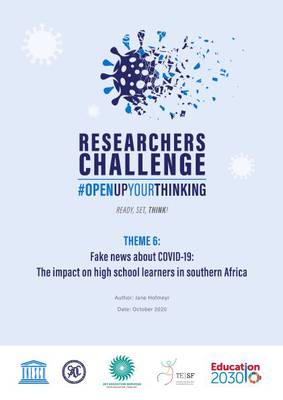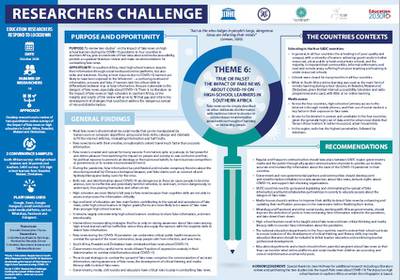Theme 6: Curbing the spread of fake news in Southern Africa - what we can and cannot do
Thematic lead: Brendah Chuma
Peer Reviewer: Al-Amin Yusuph (UNESCO ROSA), Tshepo Motsepe (Zenex Foundation)
To be pitched from the perspective of demystifying the science around the pandemic and having a robust communications plan to support getting the right clear messages to learners and their families and the wider community. https://www.facebook.com/unesco/videos/1424926840971136/
In the wake of the 2016 US elections, the words “fake news” started making international headlines. This was as a result of an election that was filled with too much information spread by the presidential candidates and their supporters, where social media became the bedrock in which fake news was spread. In the South African context, fake news has seen many stories being shared without being fact-checked and those who normally do the fact-checking do so after the fact, this is when fake news has gained credence in the life of society. It is an easy assumption that the problem of fake news can be seen as a binary between real and fake news, the problem is much deeper than that as fake can be seen as real and real as fake.
Meyer, writing for the Atlantic, contends that “Fake news and false rumours reach more people, penetrate deeper into the social network, and spread much faster than accurate stories” this could be attributed to what has been described above as the ability of fake news to elicit strong emotions amongst its recipients. The real problem facing us, is that many people lack skills that are needed in order to assess and evaluate information that comes from different sources of information. This lack of knowledge on how to assess the credibility of information has led to human beings being led by digital platforms and reduced to sharing information that has not been Fact-Checked leading to the spread of Fake news in some cases, mostly during times when people are awaiting credible updates.
Key Research Questions
The paper aims to:
- Be a source of information in the region by promoting and detailing methods of identifying fake information.
- Promote awareness and knowledge of the resources available to teacher, parents, and learners that gather and #FactCheck information related to schooling during the Covid-19 epidemic.
- Curate resources that children, parents, and teachers can use and learn skills in identifying fake news.
Materials will be shared, allowing learners to use a communication platform that will list resources available to teachers, parents, and other learners not only during the crisis but also in the weeks and months that follow. These learners will be known as #teacherslittlehelper the materials that can be shared include and is not limited to the following e.g. a descriptive infographic of e.g. Website Big History directing teachers to relevant content, Virtual museum tours, YouTube videos
Use what we have learned as African school communities when we experienced previous epidemic conditions on the continent that has helped us/our schools to be better prepared.
Download the final report and infographic
 |
 |
|
| SADC Theme 6 Final report: Impact of fake news | SADC Theme 6 Final Infographic: Impact of fake news |

